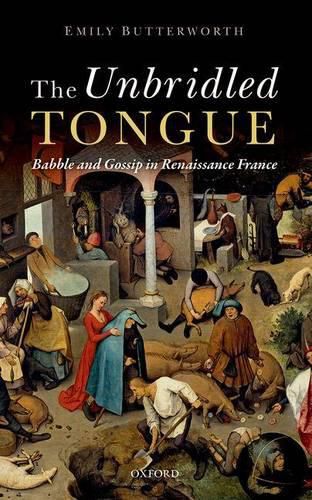Readings Newsletter
Become a Readings Member to make your shopping experience even easier.
Sign in or sign up for free!
You’re not far away from qualifying for FREE standard shipping within Australia
You’ve qualified for FREE standard shipping within Australia
The cart is loading…






The Unbridled Tongue looks at gossip, rumour, and talking too much in Renaissance France in order to uncover what was specific about these practices in the period. Taking its cue from Erasmus’s Lingua, in which both the subjective and political consequences of an idle and unbridled tongue are emphasised, the book investigates the impact of gossip and rumour on contemporary conceptions of identity and political engagement. Emily Butterworth discusses prescriptive literature on the tongue and theological discussions of Pentecost and prophecy, and then covers nearly a century in chapters focused on a single text: Rabelais’s Tiers Livre, Marguerite de Navarre’s Heptameron, Ronsard’s Discours des miseres de ce temps, Montaigne’s ‘Des boyteux’, Brantome’s Dames galantes and the anonymous Caquets de l'accouchee. In covering the ‘long sixteenth century’, the book is able to investigate the impact of the French Wars of Religion on perceptions of gossip and rumour, and place them in the context of an emerging public sphere of political critique and discussion, principally through the figure of the ‘public voice’ which, although it was associated with unruly utterance, was nevertheless a powerful rhetorical tool for the expression of grievances. The Cynic virtue of parrhesia, or free speech, is similarly ambivalent in many accounts, oscillating between bold truth-telling (liberte) and disordered babble (licence). Drawing on modern and pre-modern theories of the uses and function of gossip, the book argues that, despite this ambivalence in descriptions of the tongue, gossip and idle talk were finally excluded from the public sphere by being associated with the feminine and the irrational.
$9.00 standard shipping within Australia
FREE standard shipping within Australia for orders over $100.00
Express & International shipping calculated at checkout
The Unbridled Tongue looks at gossip, rumour, and talking too much in Renaissance France in order to uncover what was specific about these practices in the period. Taking its cue from Erasmus’s Lingua, in which both the subjective and political consequences of an idle and unbridled tongue are emphasised, the book investigates the impact of gossip and rumour on contemporary conceptions of identity and political engagement. Emily Butterworth discusses prescriptive literature on the tongue and theological discussions of Pentecost and prophecy, and then covers nearly a century in chapters focused on a single text: Rabelais’s Tiers Livre, Marguerite de Navarre’s Heptameron, Ronsard’s Discours des miseres de ce temps, Montaigne’s ‘Des boyteux’, Brantome’s Dames galantes and the anonymous Caquets de l'accouchee. In covering the ‘long sixteenth century’, the book is able to investigate the impact of the French Wars of Religion on perceptions of gossip and rumour, and place them in the context of an emerging public sphere of political critique and discussion, principally through the figure of the ‘public voice’ which, although it was associated with unruly utterance, was nevertheless a powerful rhetorical tool for the expression of grievances. The Cynic virtue of parrhesia, or free speech, is similarly ambivalent in many accounts, oscillating between bold truth-telling (liberte) and disordered babble (licence). Drawing on modern and pre-modern theories of the uses and function of gossip, the book argues that, despite this ambivalence in descriptions of the tongue, gossip and idle talk were finally excluded from the public sphere by being associated with the feminine and the irrational.